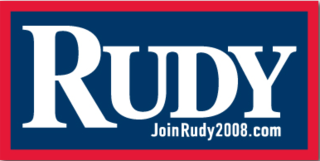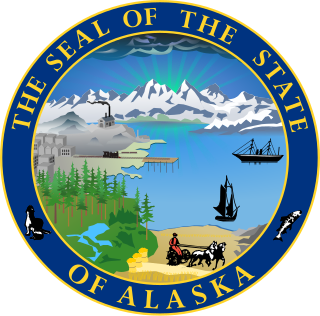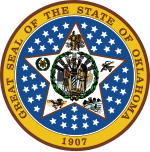
The 2008 United States presidential election was the 56th quadrennial presidential election, held on Tuesday, November 4, 2008. The Democratic ticket of Barack Obama, the junior senator from Illinois, and Joe Biden, the senior senator from Delaware, defeated the Republican ticket of John McCain, the senior senator from Arizona, and Sarah Palin, the governor of Alaska. Obama became the first African American to be elected to the presidency, as well as being only the third sitting United States senator elected president, joining Warren G. Harding and John F. Kennedy. Meanwhile, this was only the second successful all-senator ticket since the 1960 election and is the only election where both major party nominees were sitting senators. This was the first election since 1952 in which neither the incumbent president nor vice president was on the ballot, as well as the first election since 1928 in which neither ran for the nomination.
The following is a timeline of major events leading up to and immediately following the United States presidential election of 2008. The election was the 56th quadrennial United States presidential election. It was held on November 4, 2008, but its significant events and background date back to about 2002. The Democratic Party nominee, Senator Barack Obama of Illinois, defeated the Republican Party's nominee, Senator John McCain of Arizona.

The 2008 Iowa Republican presidential caucuses took place on January 3, 2008. The Iowa Republican caucuses are an unofficial primary, with the delegates to the state convention selected proportionally via a straw poll. The Iowa caucuses mark the traditional formal start of the delegate selection process for the 2008 United States presidential election.

From January 3 to June 3, 2008, voters of the Republican Party chose their nominee for president in the 2008 United States presidential election. Senator John McCain of Arizona was selected as the nominee through a series of primary elections and caucuses culminating in the 2008 Republican National Convention held from Monday, September 1, through Thursday, September 4, 2008, in Saint Paul, Minnesota. President George W. Bush was ineligible to be elected to a third term due to the term limits established by the 22nd Amendment.
This article lists statewide public opinion polls conducted relating to the 2008 Republican Party presidential primaries, typically using standard statistical methodology.

The 2008 presidential campaign of Rudy Giuliani began following the formation of the Draft Giuliani movement in October 2005. The next year, Giuliani opened an exploratory committee and formally announced in February 2007 that he was actively seeking the presidential nomination of the Republican Party.
In early 2007, Ron Paul, a congressman from Texas, announced his candidacy for the Republican Party's nomination for president of the United States in the 2008 election. Initial opinion polls during the first three quarters of 2007 showed him consistently receiving support from 3% or less of those polled. In 2008, Paul's support among Republican voters remained in the single digits, and well behind front-runner John McCain.
The first political debate before the 2008 Republican primaries was held on May 3, 2007, at the Ronald Reagan Presidential Library in California. Other debates have taken place in New Hampshire, South Carolina, and Florida. They were generally broadcast by television networks.

The Mike Huckabee 2008 presidential campaign began on January 28, 2007, when former Governor of Arkansas Mike Huckabee announced his candidacy for the Republican nomination for President of the United States for the 2008 election. Huckabee ultimately ended his bid for the nomination after losing the Texas Republican primary on March 4, 2008.

The 2008 United States presidential election in Iowa took place on November 4, 2008, as part of the 2008 United States presidential election. Voters chose seven representatives, or electors to the Electoral College, who voted for president and vice president.

The 2008 Michigan Republican presidential primary took place on January 15, 2008. Mitt Romney came in first with 39 percent of the vote, followed by John McCain with 30 percent and Mike Huckabee in third-place with 16 percent. The victory was widely viewed as critical for the Romney campaign, as a loss in Michigan, where his father was governor, would have resulted in a loss of momentum after two losses already in New Hampshire and Iowa.

The 2008 Nevada Republican presidential caucuses was held on January 19, the same day as the 2008 South Carolina Republican primary, with 31 delegates at stake. Mitt Romney was the winner in Nevada with 51% of the votes, with Ron Paul in second place. Half of Romney's votes came from Mormons, while two-thirds of the independent voters favored Paul. According to the Las Vegas Sun, Republicans crossed over in large numbers to vote Democratic; CNN exit polls indicated that Republican voters made up 4% of the Democratic caucus turnout.

The 2008 Florida Republican presidential primary was held on January 29, 2008, with 57 delegates at stake on a winner-take-all basis. The Republican National Committee removed half of Florida's delegates because the state committee moved its Republican primary before February 5.

The 2008 Connecticut Republican presidential primary was held on February 5, 2008 as the process by which the U.S. state of Connecticut selected the recipient of 27 of the state’s 30 delegates to the Republican National Convention in the process to elect the Republican candidate for the 44th President of the United States. It was a closed primary, restricted to enrolled members of the Republican Party.

The 2008 Delaware Republican presidential primary was held on February 5. A total of 18 delegates were selected. The Delaware Republican Party rallied behind John McCain, and he was the declared winner of the primary election after successfully taking all three Delaware counties. McCain was followed by Mitt Romney in second and then by Mike Huckabee in third.

The 2008 Alaska Republican presidential caucuses were held on February 5, 2008, and has a total of 26 delegates at stake. Mitt Romney won the state, and, as the winner in Alaska's congressional district, was awarded all of that district's delegates. All results are from the presidential preference poll held at the caucuses. Actual delegates were selected on February 5 or 9 at district conventions held throughout the state, and finally at a statewide convention held between March 13–15 in Anchorage.

The 2008 Tennessee Republican presidential primary took place on February 5, 2008, with 52 national delegates. Mike Huckabee narrowly defeated John McCain to win the largest share of Tennessee's delegates to the 2008 Republican National Convention. Both McCain and the third-place candidate Mitt Romney received delegates along with Huckabee.

The 2008 West Virginia Republican presidential caucuses took place on February 5, 2008, to select 18 delegates to the 2008 Republican National Convention. An additional nine delegates were selected in a primary election on May 13, 2008, for a total of 27 delegates to the national convention. Mike Huckabee won the caucuses, and John McCain later won the primary.

The 2008 United States presidential election in Delaware took place on November 4, 2008, and was part of the 2008 United States presidential election. Voters chose three representatives, or electors to the Electoral College, who voted for president and vice president.

The 2008 United States presidential election in New Hampshire took place on November 4, 2008, as part of the 2008 United States presidential election throughout all 50 states and the District of Columbia. Voters chose four representatives, or electors to the Electoral College, who voted for president and vice president.


















